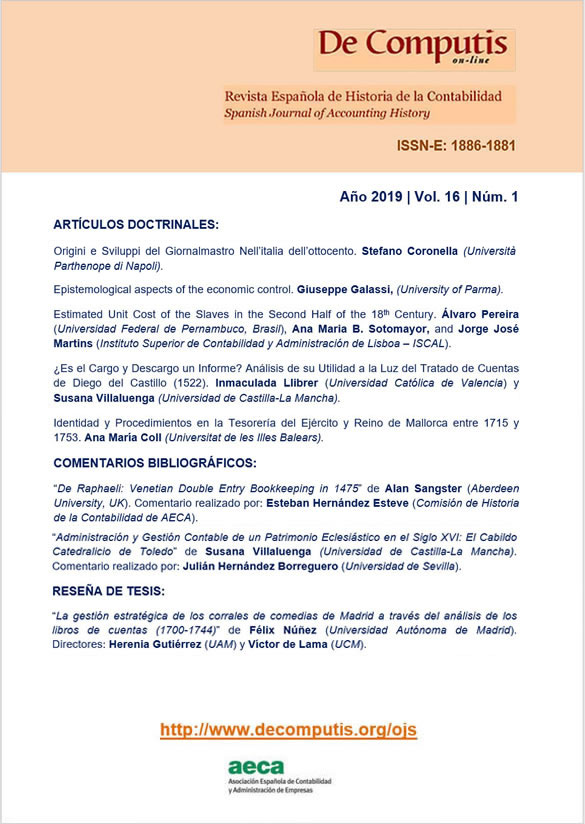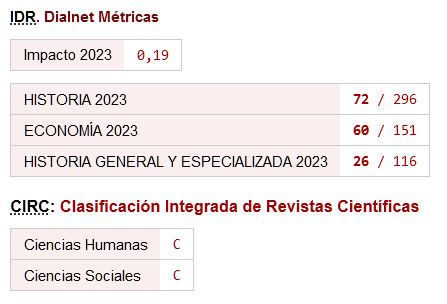Estimated unit cost of the slaves in the second half of the 18th century
DOI:
https://doi.org/10.26784/issn.1886-1881.v16i1.344Palabras clave:
Slaves, expenditures, cost, estimated unit cost, management, Pernambuco, AngolaResumen
Previous surveys based on historical documents on the price of slaves from Africa have contributed
greatly to accounting literature. However, most of these studies usually focus on the sale price of slaves in the colonies or on slave purchase prices in Africa. Therefore, no work has been observed in the literature relating to the effective or estimated unit cost of slaves, taking into account the total cost of all phases of the slave trade. This study aims to bring to the literature of accounting history an approach on the estimated unit cost of slaves based
on estimated total cost of all costing phases of captive transportation from Angola to Pernambuco. This approach was found in a historical document dated November 12, 1758, written by the governor of the captaincy of Pernambuco - Luis Diogo Lobo da Silva. This document was written in fulfillment of the orders of the king of Portugal, D. José I, in order to prepare a list of ships capable of transporting slaves from Africa and the details of
necessary provisions for the slaves, who would be sent from Angola to Pernambuco. Luis Diogo Lobo da Silva was governor of the captaincy of Pernambuco from 1756 to 1763, and he was recognized for his qualities as a good colonial administrator and for adopting good management practices in his work.
Descargas
Citas
Anisette, M. (2009). Race and Ethinicity. In The Routledge companion to accounting history. Edwards, R., & Walker, S. P. (eds). New York, Routledge.
Antonelli, V., Cerbione, F., and Parbonetti, A. (2002). The origins of cost accounting: the evidence from Italy. https://doi.org/10.1080/09585200210164601
Accounting, Business and Financial History, 12(3):461-486.
Azevedo, J. L. (1928). Épocas de Portugal econômico. São Paulo: Livraria Clássica Editora,
Barney, D., and D.L. Flesher. (1994). Early nineteenth-century productivity accounting: The locust grove plantation slave ledger." Accounting, Business and Financial History 4 (2): 275-294. https://doi.org/10.1080/09585209400000046
Burnard, Trevor. (2007). The atlantic slave trade and the african ethnicities in seventeenh-century Jamaica. In D. Richardson, S. Shwarz & A. Tibbles (Eds), Liverpool and transatlantic slavery, 138-163. Liverpool: Liverpool University Press.
Carnaxide, A. S. P.V. (1979). O Brasil na administração pombalina: economia e política externa. (2.ed), São Paulo: Ed. Nacional.
Carnegie, G. D., Napier, C. J. (2012). Accounting's past, present and future: the unifying power of history. Accounting, Auditing & Accountability Journal, Vol. 25, N. 2, 328-389. https://doi.org/10.1108/09513571211198782
Carreira, A. (1982). As companhias pombalinas de Grão-Pará e Maranhão e Pernambuco e Paraiba. Lisboa: Presença.
Carreira, A. (1983). Notas sobre o tráfico português de escravos. (2 ed), Lisboa: Universidade Nova Lisboa.
Carvalho, J. M., Rodrigues, L.L. e Craig, R. (2007). Early cost accounting practices and private ownership: The Silk Factory Company of Portugal, 1745-1747. Accounting Historians Journal, 34 (1), 57-90.
Carvalho, J. M. M., Cochicho, J. A., Rodrigues, M. J. B. e Paixão, J. C. (2016). Alguns aspectos da contabilidade de manufacturas portuguesas do século XVIII: o caso da Companhia da Fábrica das Sedas - 2ª.
Administração (1745-1747). Boletim do Centro de Estudos de História da Contabilidade, APOTEC. No. 66, 1-10.
Correa, F. A. (1931). A administração do Marquês de Pombal - O Comércio e as Companhias privilegiadas. Lisboa: Instituto Superior de Ciências Econômicas e Financeiras.
Correa, A. E. (1937). História de Angola - manuscrito de 1782). Coleção dos clássicos da Expansão Portuguesa no Mundo, 2 volumes. Série E, Império Africano. Lisboa: Ática.
Costa, L. F., Lains, P. e Miranda, S. M. (2011). História econômica de Portugal. (3.ed), Lisboa: Esfera dos Livros.
Crane, Andrew. (2013). Modern slavery as a management practice: exploring the conditions and capabilities for human exploitation. Academy of Management Review, vol. 38, (1) 45-69. https://doi.org/10.5465/amr.2011.0145
Darity, W. (1985). The numbers game and profitability of British trade in slave. The Journal of Economic History, vol.45, (3) 669-703. https://doi.org/10.1017/S0022050700034616
Dough Barney e Dale Flesher. (1994). Early nineteenth century productivity acdounting: the locust grobe plantation slave ledger. Accounting Review History - Business and Financial History, 2, 275-294. https://doi.org/10.1080/09585209400000046
Duquette, N. (2014). Revealing the relationship betwwen ship rowding and the slave mortalty. Journal of Economic History, 74(2), 535-552. https://doi.org/10.1017/S0022050714000357
Eltis, D. (1984). "Mortality and Voyage Length in the Middle Passage: New Evidence from the Nineteenth Century." The Journal of Economic History 44, (2), 301-308. https://doi.org/10.1017/S0022050700031909
Eltis, D., Lewis, F., McIntyre, K. (2010) "Accounting for the Traffic in Africans: Transport Costs on Slaving Voyages." Journal of Economic History 70, ( 4 ), 12: 940-963. https://doi.org/10.1017/S0022050710000781
Falcon, F. J. C. (1993). A época pombalina: política econômica e monarquia ilustrada.São Paulo: Ática.
Ferronha, A. L. (1994). O comércio português de escravos. Grupo de Trabalho do Ministério da Educação para as Comemorações os Descobrimentos. Lisboa: Imprensa do Ministério da Educação de Portugal.
Fleischman R., and T. Tyson. (2004). Accounting in service to racism: Monetizing slave property in the antebellum south. Critical Perspectives on Accounting 15 (3), 376-99. https://doi.org/10.1016/S1045-2354(03)00102-3
Fleischman, R., D. Oldroyd, and T. Tyson. (2004). Monetising human life: Slave valuations on US and British West Indian plantations. Accounting History 9 (2), 35-62. https://doi.org/10.1177/103237320400900203
Fleischman, R., D. Oldroyd, and T. Tyson. (2011). Plantation accounting and management practices in the US and the British West Indies at the end of their slavery eras. Economic History Review 64 (3): 765-97. Gorender, J. (1978). O escravismo colonial. São Paulo: Ática.
Hansen, R. D.; Mowen, M. M. (1999). Cost management-accounting and control. (3 ed), Nashville: South-Western College Publishing.
Hornegren, C. T., Bhirmani, A., Datar, S. M., e Foster, G. (2002). Management and cost accounting (2rd ed). New Jersey: Prentice-Hall.
Inikory, J. E., Measuring the atlantic slave trade: a rejoinder. The Journal of African History, vol. 17, (4), 607-627. https://doi.org/10.1017/S0021853700015103
Junior, J. R. (2004). Colonização e o monopólio do nordeste brasileiro: a Companhia Geral de Comércio de Pernambuco e Paraiba, 1759-1780. São Paulo: Hucitec.
Klein, H. S. (2002). O Comércio atlântico de escravos - quatro séculos de comércio esclavagista. Editora Replicação Ltda : Lisboa.
Lara, A. S. (1981). A politica econômica do Marquês de Pombal - apontamentos ensaísticos. Porto : Resistência.
Lopes, G. A. (2008). Negócio da Costa da Mina e comércio atlântico: tabaco, acúcar, ouro e tráfico de escravos. Pernambuco (1654-1760). Tese de doutoramento, Universidade de São Paulo.
Lovejoy, P. E., & Richardson, D. (2007). African agency and the Liverpool slave trade. In D. Richardson, S. Shwarz & A. Tibbles (Eds), Liverpool and transatlantic slavery. 43-65. Liverpool: Liverpool University Press.
Luft, J. (2007). Historical theorizing in management accounting research. In Handbook of Management Accouting. https://doi.org/10.1016/S1751-3243(06)01009-1
Reserch. Chapman, C. S., Hopwood, A., e Shields, M. D.m(eds), vol. 1, Oxford, UK. Elsivier, 269.
Macedo, J. B. (1982). Problemas da história d indústria portuguesa no século XVIII. (2a ed), Lisboa : Querco.
Malheiro, A. M. P. (1976). A escravidão no Brasil. Rio de Janeiro: Tipografia Nacional.
Mancall, P. C., Rosembloom, J. L., Weiss, T. (1998). Slave Prices and The Economy of the Lower-South, 1722-1809 http://www.cliometrics.org/conferences/ASSA/Jan_00/rosenbloom.shtml - publicado em 1998.
Mancall, Peter C., Rosenbloom, Joshua L., e Weiss, Thomas.(2000). Disponível em http://www.cliometrics.org/conferences/ASSA/Jan_00/rosenbloom.shtml - 16/04/2018.
Marconi, M. A., Lakatos, E. M. (2003). Fundamentos da metodologia científica (5 ed), São Paulo: Atlas.
Martins, R.E. E. (1952). Para a História da Contabilidade Pública em Portugal. Revista de Contabilidade e Comércio. (8), Porto Médico, 10-11.
Medina, J., Henriques, I. C. (1996). A rota dos escravos - Angola e a rede de comércio negreiro. Lisboa: CEGIA.
Mesquita, J. C.V. (1984). A importância do Brasil na economia portuguesa so século XVIII. Lisboa: Editora Faro.
Miller, J. C. (1986). Slaves prices in the Portuguese Southern atlantic 1600-1830. In Africans in bondage studies in slavery trde: essas in honor of Philip Curti non the occasion of the twenty-fifth aniversary of african studies at the University of Wisconsin. Cambridge, 43-47.
Napier, C. (2001). Accounting history and accounting progress. Accounting History, 6(2), 7-31. https://doi.org/10.1177/103237320100600202
Oldroyd, D., R.K. Fleischman, and T.N. Tyson. (2008). The culpability of accounting practice in promoting slavery in the British empire and antebellum United States." Critical Perspectives on Accounting 19 (5): 764-84. https://doi.org/10.1016/j.cpa.2006.11.005
Pedreira, J. M. (1992). Os negociantes de Lisboa na segunda metade do século XVIII: padrões de recrutamento e percursos sociais. Análise Social, vol. XXVII, 106-117, 2º.-3º - 407-440.
Pinto, O., e West, B. (2017a). Accounting, slavery and social history: the legacy of eighteenth-century portuguese chartered company. Accounting History. v. 22(2), 141-166. https://doi.org/10.1177/1032373217696512
Pinto, O., e West, B. (2017b). Accounting and the history of everiday life of capitains, sailor and common seamen in eighteenth-century Portuguese slave trade. Accounting History, v. 22(30), 320-347. https://doi.org/10.1177/1032373217703756
Reis, M. B. N., Rodrigues S. O. (2013). Porto e comércio da segunda metade do século XVIII. A Companhia Geral da Agricultura das Vinhas do Alto Douro e os negócios do vinho. Tese de doutoramento em História, FLUP.
Richardson, D. (1985). Profit in the Liverpool slave trade: the accounts of William Davenport, 1755-1784.(pp.60-90).Disponível em: https://www.hslc.org.uk/wp-content/uploads/2017/10/5-Richardson.pdf.
Richardson, D. (1987). The Costs of Survival: The Transport of Slaves in the Middle Passage and the Profitability of the 18th-century British Slave Trade. Explorations in Economic History, 24, 178-196. https://doi.org/10.1016/0014-4983(87)90011-8
Richardson, D. (1989). Accounting for profits in the British trade in slaves: reply to William Darity. Explorations in Economic History, 26, 492-499. https://doi.org/10.1016/0014-4983(89)90020-X
Rodrigues, L.L., and A. Sangster. (2012). Public-private partnerships: The Portuguese General Company of Pernambuco and Paraiba (1759). Business History 54 (7), 1142-65. https://doi.org/10.1080/00076791.2012.692079
Rodrigues, J. ( 1998). O tráfico de escravos para o Brasil(2.ed), São Paulo : Atica, (p.38).
Santos, M. M. (2004). O preço dos escravos no tráfico atlântico - hipoteses e explicações. Africana Studia, (7), 163-181.
Saraiva, J. M. C. (1941). Companhia Geral de Pernambuco e Paraiba. Lisboa : Arquivo Histórico do Ministério das Finanças de Portugal.
Silva, A. R. (2014). Slave service accounting practices in Brazil: a bibliografic and document analysis. R.Cont. Fin. USP, São Paulo, v. 25 Edição "História da Contabilidade", 346-354, set/out/nov/dez. https://doi.org/10.1590/1808-057x201411060
Smith, M. (2007). Research methods in accounting (5. ed). London: SAGE Publications.
Taunay, A. E. (1941). Subsídios para a história do tráfico africano no Brasil. Rio de Janeiro: Imprensa Oficial do Estado.
UNESCO (1978). O tráfico de escravos negros sécs. XV-XIX - Documentos de trabalho e relatório da reunião de peritos. UNESCO: Port-au-Prince, Haiti
Vasconcelos, P. A. (1999). O "real" valor do "Dinheiro": 850 anos de história de inflação em Portugal. Sacavém-Portugal: DistriCultural.
Walvin, J. (2001). O tráfico de escravos. Lisboa. Temas e Debates - Actividades Editoriais.
Williams, E. (2008). Capitalismo e escravidão. São Paulo: Companhia das Letras.
Descargas
Publicado
Cómo citar
Número
Sección
Licencia

Esta obra está bajo una licencia internacional Creative Commons Atribución-NoComercial-CompartirIgual 4.0.










